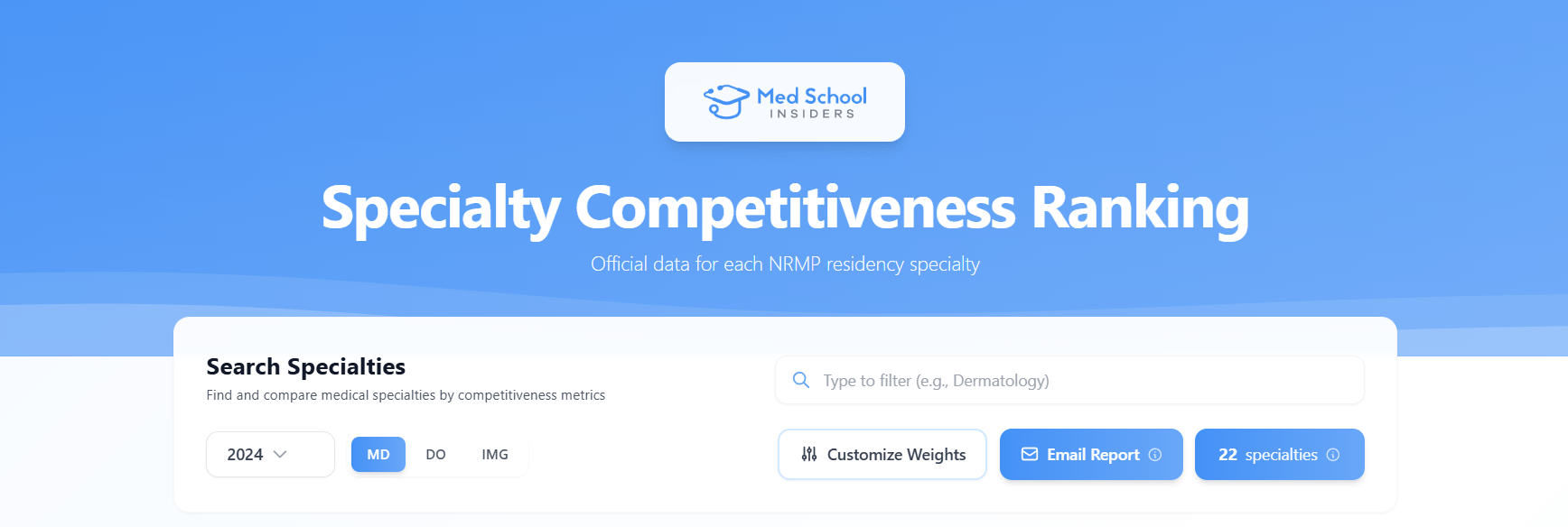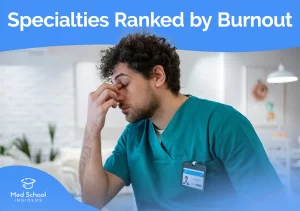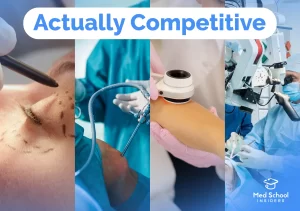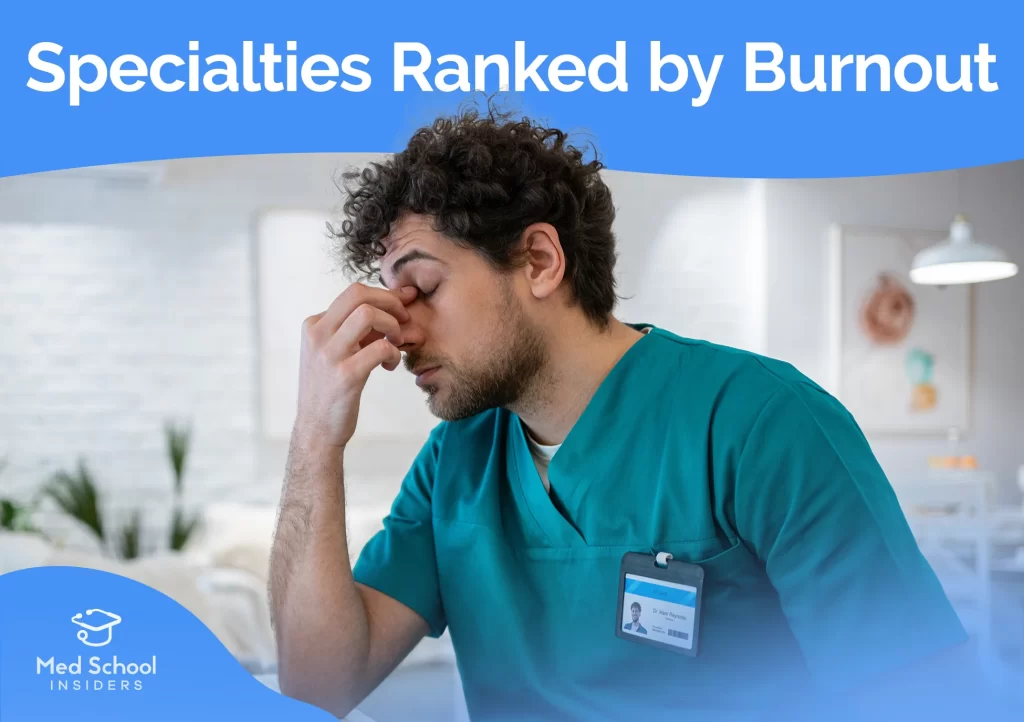Opinions are like belly buttons. Everyone has one—especially med students and physicians, when it comes to which specialties are more or less competitive. But unfortunately, most of it is just noise, ego, and misinformation.
Just because someone says their specialty is the most competitive doesn’t make it true. So, how do you actually know which specialties are easier or harder to match into? Because if you’re a premed or med student planning your future, it’s something you need to know.
Why This Matters (More Than You Think)
Choosing a specialty shapes your lifestyle, your student debt payoff timeline, and your overall quality of life. If you spend four years grinding yourself into the ground trying to match into a specialty that’s actually quite attainable, you’re sacrificing unnecessary time and mental energy.
On the flip side, if you’re unprepared for a genuinely competitive field, you could end up unmatched or scrambling into a less desirable program. The stakes are high, which is why so much misinformation exists in the first place.
Competitiveness Requires Data, Not Gut Feelings
Forget what feels hard. Forget which specialty sounds prestigious at dinner parties or which one your attending physician keeps bragging about. Competitiveness relies on actual measurable trends backed by hard official data from the National Resident Matching Program (NRMP), the organization that helps you match into a specialty for residency.
The NRMP publishes data each year on match outcomes; this is your source of truth. Not Reddit. Not your medical school’s gossip mill. Hard data.
How to Actually Measure Competitiveness
To assess how competitive a specialty truly is, you have to look at multiple factors, not just one. These include:
- Match Rate: What percentage of applicants successfully match into this specialty?
- Step Scores: What are the average USMLE Step 1 and Step 2 CK scores of matched applicants? This tells you what the baseline performance looks like.
- Research Output: How much research experience do successful applicants typically have? Some specialties value research heavily (think dermatology, plastic surgery), while others care far less.
- AOA Status: Are matched applicants predominantly AOA members?
- Top 40 NIH Funding: Did applicants go to schools with significant NIH funding?
Each of these factors tells part of the story. Together, they give you a real picture of what it takes to match.
But most people never look at these factors. Instead, they rely on what they’ve heard.
The Anecdote Problem
Everyone has a story. Your senior matched into derm with a 240 Step 2 CK. Your attending swears dermatology is the most competitive specialty in existence. These are real people, real stories, and they feel true because they’re personal.
But that senior was likely already competitive with excellent grades, strong board scores, and solid research. Their experience isn’t the baseline—it’s just their experience. The problem is that anecdotes are sticky. They lodge in your brain and shape decisions, even though a single success story tells you almost nothing about what it actually takes to match.
Take psychiatry. A couple of years ago, the anecdotes started circulating: psychiatry was the new impossible specialty. “Psych is like the new neurosurgery. It’s impossible,” everyone said. Students panicked. They changed their plans, added research projects they didn’t care about, and stressed themselves out unnecessarily.
Then you look at the actual data. Psychiatry ranked number 19 out of 21 specialties. It did get more competitive, jumping to 15, making it genuinely more challenging to match into. But then, a year or two later, it settled back down to 18—nowhere near neurosurgery, which now ranks second in our competitiveness ranking.
The point is that data keeps shifting, and students are panic-applying based on whatever year’s gossip they heard. That stress shapes real decisions. It affects how hard you’re grinding at school. It impacts your lifestyle and your work-life balance. You might choose a different specialty entirely, missing out on a field you actually loved. All based on hype, not data.
Data tells you what anecdotes don’t.
Finding the Real Data
You can find all these data points in one place for every single year over the last 10 years across all specialties at specialtyrank.com. The tool has its own interpretation of the data with specific rankings that prioritize match rate and step scores as the most critical factors.
But here’s the best part: you’re not locked into their weighting system. You can customize your own weightings based on what actually matters to your situation.

If you’re coming from a school with tons of research opportunities, bump up the weight of research output. You can leverage that advantage.
If you’re a strong board test-taker, prioritize Step scores more heavily and see how that changes the rankings.
If you care more about lifestyle than prestige, you can weigh match rate and burnout indicators more heavily than traditional competitive metrics.
This lets you see how competitive your specialty of interest actually is, based on what matters most to you—not an arbitrary ranking system.
So what does the data actually reveal when you dig into it?
How to Use This Information
Once you know the actual competitiveness of your specialty, you can make a real plan for what you need to do to match into it.
If your specialty is genuinely competitive (like dermatology, plastic surgery, or orthopedic surgery), you know you need strong board scores, research experience, and clinical letters. You can work backward from that.
If your specialty is more attainable than people think, you can breathe. You can focus on being a good clinician, getting solid letters of recommendation, and showing genuine interest in the field. You don’t need to optimize everything.
And if your specialty has become more competitive recently, you can adjust accordingly. It may become more competitive, so you need to strengthen your application. Or maybe it’s become less competitive, so you have more flexibility than you thought.
The Bottom Line
The next time you hear something about a specialty being impossible or super competitive, don’t just accept it. Go to the data yourself. Play around with the numbers. Customize the weightings based on your situation.
You’ll rest assured knowing whether you’re facing real competition or just hype. And more importantly, you’ll make decisions based on what’s actually true, not what feels true.
Check it out at specialtyrank.com and spend some time exploring. See which specialties surprise you. See how the data shifts year to year. See what it actually takes to match into the field you care about.
Because the truth is, specialty competitiveness is measurable. It’s not magic. It’s not mysterious. It’s just data. And now you know where to find it.







